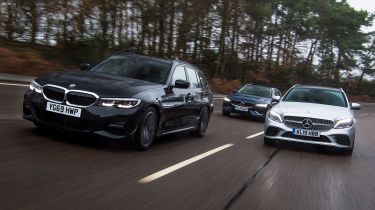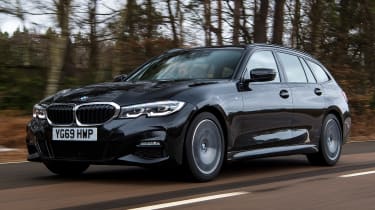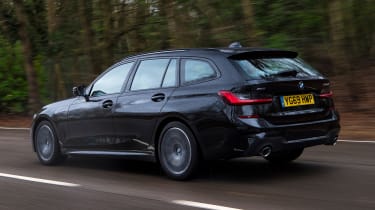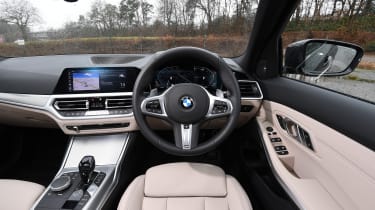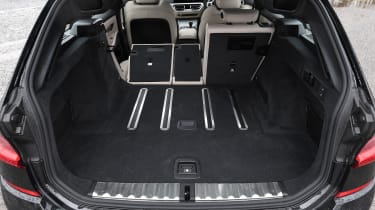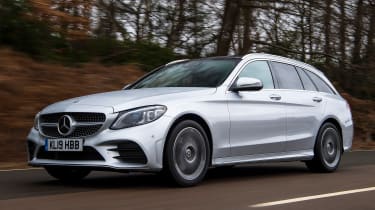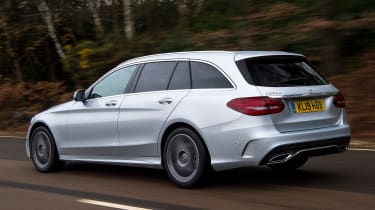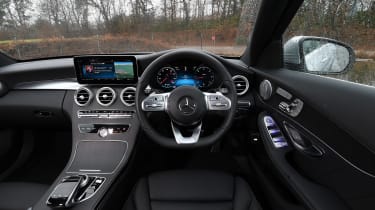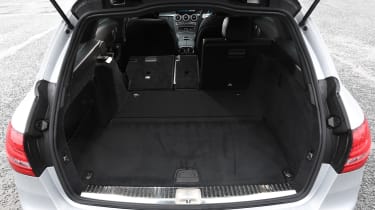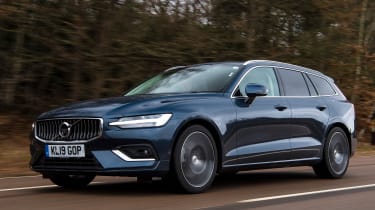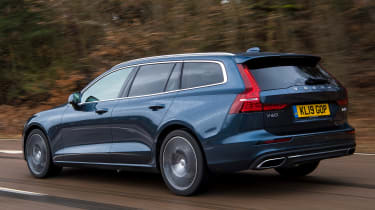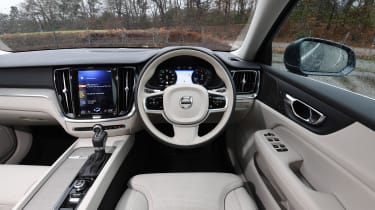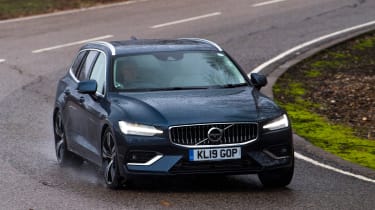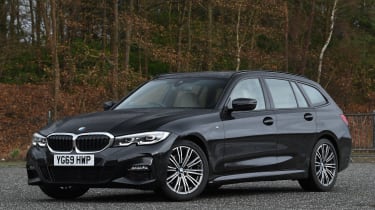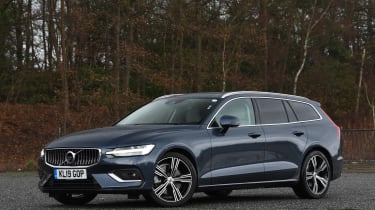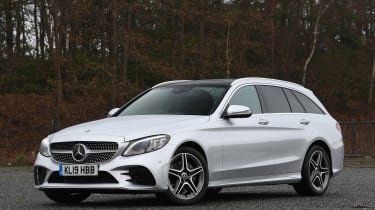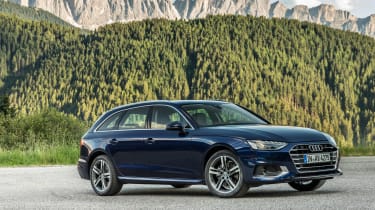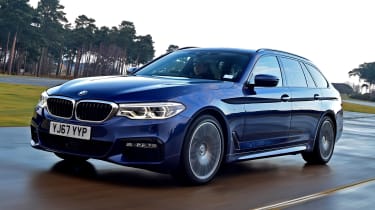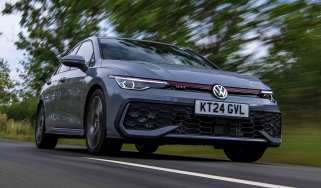BMW 3 Series Touring vs Mercedes C-Class Estate vs Volvo V60
SUVs are encroaching on their territory, so it's crunch time for BMW 3 Series Touring, Mercedes C-Class Estate and Volvo V60
The BMW 3 Series saloon was one of the best cars to come out in 2019, as we found out throughout the year. It stormed to victory in its first test at the start of 2019, and then we ran a model on our test fleet that continued to impress during its six months with us. It also won the title of Best Compact Executive car at our New Car Awards last summer.
But a saloon isn’t perfect for everyone. If you need a bit more practicality than a hatch brings, plus the extra space to carry big items, an estate could be even better – and a nice alternative to an SUV if they’re not your thing. Which brings us to the 3 Series Touring that we’re putting up against two of its toughest rivals in the BMW’s first group test, a year on from our first test of the saloon.
Those key competitors are the Mercedes C-Class Estate and the Volvo V60. All three of these cars add a longer roofline and a hatchback tailgate to create extra space and versatility compared with their saloon siblings.
Yet they still have to provide the important aspects that executive car buyers want: comfort, driver enjoyment, a high-quality interior and the latest technology. Which one of these upmarket estate cars brings these aspects together most effectively?
BMW 3 Series Touring
| BMW 320d xDrive Touring M Sport | |
| Price: | £41,325 |
| Engine: | 2.0-litre 4cyl diesel, 187bhp |
| 0-60mph: | 7.2 seconds |
| Test economy: | 40.8mpg/9.0mpl |
| CO2: | 124g/km |
| Annual road tax: | £465 |
BMW launched this version of the 3 Series with an all-new platform, fresh engines and the latest in-car tech. Now it’s time to see how the Touring version rates. Here we’ve got a 320d xDrive in M Sport trim, which costs £41,325.
Used - available now

2017 BMW
3 Series
43,640 milesAutomaticPetrol2.0L
Cash £11,899
2022 BMW
3 Series
36,557 milesAutomaticPetrol2.0L
Cash £21,848
2022 BMW
3 Series
42,025 milesAutomaticPetrol2.0L
Cash £20,327
2022 BMW
3 Series
39,265 milesAutomaticPetrol2.0L
Cash £20,495Design & engineering
The Touring adds a longer roofline and a different tailgate in its transformation from saloon to estate, which also means the boot becomes part of the cabin. This allows you to fold the rear seats down to create even more room inside, but we’ll take a closer look at this in the Practicality section.
Many of BMW’s models are based on the brand’s CLAR architecture, including the latest 3 Series. The platform brought improvements to torsional rigidity and reduced weight. It uses multi-link rear suspension, with MacPherson struts at the front.
Clever lift-dependent suspension damper technology reacts to the weight the car is carrying, so when it’s full of people, the damping is tauter to control the extra heft. Adaptive dampers are part of the optional £2,200 M Sport Plus Package.
This 320d model uses a 2.0-litre four-cylinder diesel unit that delivers 187bhp and 400Nm of torque. It has two turbochargers: a smaller one to bring better responsiveness at low revs and a larger one to boost power at higher revs.
An eight-speed gearbox sends power to all four wheels in this xDrive car, although we reckon the rear-wheel-drive 320d is the better choice, because it will be cheaper to buy and be a little more fuel-efficient.
The Touring’s cabin is just as good as the saloon’s; it has the build quality buyers in this market expect, plus a neat, classy design with good use of high-quality materials in the right places. It also features all the tech you’d want, including a 10.25-inch touchscreen infotainment system that’s sharp, modern and easy to use. Other standard kit on M Sport includes 18-inch rims, sports suspension, heated leather seats, LED lights, a reversing camera, plus cruise and climate control.
Driving
The 320d’s engine is impressive, bringing a solid mix of performance, refinement and responsiveness. It’s quieter than its rivals’ from idle right up to high revs, and making progress is effortless thanks to the clever turbo set-up. The 320d went from 0-60mph in 7.2 seconds in our tests, just 0.1 seconds behind the more powerful Mercedes and nearly a second faster than the V60 D4.
The transmission is another strong point for the BMW, because it’s smoother to shift than those in its rivals, and also delivers rapid changes in manual mode. The auto setting is good at keeping you in a high gear and making use of the 400Nm of torque.
Along with its excellent powertrain, the 320d leads its rivals for dynamics and appeal behind the wheel. The driving position is superb, and the weight of the steering is spot-on, although it doesn’t have much feel and the wheel rim is too thick. The chassis matches this because it’s very agile, withlots of grip and a mildly adjustable balance that encourages you to drive it quickly on country roads (if you want to), because it gives so much confidence. It’s more fun than either of its competitors here, yet this focus on enjoyment doesn’t detract from comfort.
The damping is sophisticated, and while there’s a firm edge to the ride – it’s not as supple as the larger 5 Series, for example – the BMW remains composed over bumps and is just as comfy as the C-Class and V60. All three cars provide good ride comfort, but the fact the BMW has more driver appeal.
This xDrive model brings good traction in bad conditions, but we don’t feel it justifies its £3,190 cost, because it doesn’t change the driving experience in a meaningful way; we just don’t get enough extreme weather in the UK for it to be worth it.
Practicality
These estates are all about practicality, and the 320d Touring scores well here. The hatchback boot boosts luggage space over the saloon version, and while its 500-litre capacity is a little smaller than the Volvo V60’s 529 litres, it’s still a good, useable size and bigger than the Mercedes’ 460-litre boot.
It comes with some clever features. The main one is the split tailgate; you can open just the glass section of the boot door, allowing easy access for dropping in some shopping, or getting to items stashed at the top of a full load bay. It’s a great feature and only appears on the BMW here. A powered tailgate is standard, too.
Ownership
EURO NCAP awarded the 3 Series a full five stars in its 2019 safety tests, and the Touring gets kit including AEB, LED lights, parking sensors and a reversing camera as standard. The Driving Assistant Professional pack (£1,250) adds adaptive cruise, lane-keep assist, cross-traffic warning and blind-spot assist for improved protection.
BMW did poorly in our Driver Power 2019 survey though, coming in 25th overall out of 30 brands, although Mercedes was 26th. Volvo finished 13th, well ahead of its rivals for customer satisfaction.
Running costs
All three estates break the £40,000 barrier and so incur a £320 road tax surcharge, but for these models company car tax is the more important factor. The 320d xDrive emits 124g/km of CO2 and sits in the same 32 per cent bracket as the V60 D4 (122g/km), while the C-Class (119g/km) is in the 31 per cent Benefit-in-Kind band.
These figures mean higher-rate earners will pay £5,256 in tax contributions for the BMW, £5,146 for the Volvo and £5,239 this year to run the Mercedes.
Tester's notes
“The 3 Series is a superb motorway cruiser. Its engine stays hushed, wind and road noise is minimal and the suspension is at its best at a high-speed cruise. The tech helps here, too.”
Mercedes C-Class Estate
| Mercedes C 220 d Estate AMG Line Edition | |
| Price: | £41,155 |
| Engine: | 2.0-litre 4cyl diesel, 191bhp |
| 0-60mph: | 7.1 seconds |
| Test economy: | 42.3mpg/9.3mpl |
| CO2: | 119g/km |
| Annual road tax: | £465 |
The Mercedes C-Class was facelifted in 2018, and the saloon version fared well, winning its first test in that year. This is the first time we’ve brought the Estate version together with its rivals, and in C 220 d AMG Line Edition trim, it costs £41,155. We were supplied with a 4MATIC four-wheel-drive model, so our economy and performance figures are for this specification, but it’s no longer available new.
Design & engineering
The C-Class Estate is based on Mercedes’ Modular Rear Architecture (MRA). This isn’t a brand new set-up like on the latest BMW 3 Series; it was what underpinned the previous model, too, but has evolved to feature the latest technology.
Another element of the facelift included a new 191bhp 2.0-litre diesel engine, which was a big improvement over what came before. It’s the most powerful unit here, although its torque figure of 400Nm is the same as both other competitors.
It uses a slightly different suspension to its rivals, with a double-wishbone front and multi-link rear set-up, while this AMG Line Edition gets lowered sports suspension as standard. Adaptive dampers aren’t currently available on the C-Class because Mercedes has reduced the range of options on offer.
The C-Class’ interior is much more traditional than those of its rivals. The design wraps around the driver and front passenger, and while material quality is on par with the Volvo’s and BMW’s, the design doesn’t have the minimalist feel of the former nor the modern, sleek set-up of the latter.
There is still lots of technology, though. Its 10.25-inch infotainment display includes sat-nav and you also get a 12.3-inch digital instrument cluster, so it matches its rivals for displays.
AMG Line Edition models also come with 18-inch alloy wheels, LED headlights, leather seats, a reversing camera, AEB, heated seats and climate control. Changes to the C-Class range mean that there are now very few options to add; even the Premium and Premium Plus packs are now only available by going up to a higher trim level. This could be beneficial for company car drivers, though, because it cuts out paying extra tax on optional extras.
Driving
The Mercedes is set up for comfort, and it achieves this for the most part. It covers ground smoothly on most roads, and while potholes and harsher bumps do thud into the cabin, the C-Class Estate matches the BMW and Volvo for overall comfort.
The ride on the motorway offers a little more float. However, it can’t match the 320d for driver enjoyment, because there’s more body roll in corners as a result and it has numb steering. The steering has a nicer weight than the V60, but neither can match the BMW for fun. Yet with lots of grip and its punchy turbo engine, the Mercedes is still good to drive. It’s satisfying to keep your speed up in bends.
That motor is strong, too. The C-Class was quickest from 0-60mph (7.1 seconds), although it fell behind its rivals in the higher gears from 50-70mph, taking 5.9 seconds in fifth, next to the 5.0 and 5.3-second times from the BMW and Volvo respectively. Plus it needed 4.2 seconds to go from 30-50mph in fourth, while the 320d clocked 3.5 seconds and the V60 4.0 seconds. The difference is marginal, though, and this trio is fairly evenly matched for performance; you can barely tell a difference in outright speed on the road.
The C-Class’ nine-speed gearbox is smooth and slicker than the Volvo’s transmission, just. But neither can keep up with the BMW’s swift shifts. The engine isn’t as responsive either, and it’s more rattly than the 320d’s motor, although not overly so, while the Volvo’s engine is one step coarser again.
Practicality
There's lots of rear-seat legroom in the C-Class Estate, maybe even a little more than the BMW, so adults will be comfy in the back. But headroom is a little more limited.
With 460 litres of boot space with the seats up, the C-Class isn’t as spacious when it comes to luggage room. This is key for an estate car and dents the Mercedes’ appeal slightly, although folding the rear bench reveals 1,480 litres. That’s not quite as much as the BMW’s 1,510 litres, but it’s more capacity than the V60 offers, at 1,441 litres.
As on both rivals here, a powered tailgate is fitted as standard on the C-Class Estate, which helps boost the usability of this model.
Ownership
A disappointing 26th-place finish out of 30 brands in our Driver Power 2019 customer satisfaction survey needs attention from Mercedes, while BMW was only one place better. Volvo performed best, in 13th, and with its dealers in ninth. BMW’s garages came 25th, while Mercedes’ franchises finished 15th last year.
Autonomous braking and a reversing camera are standard, but the £1,695 Driving Assistance Pack isn’t available on this trim. That’s a shame because it adds blind-spot and lane-change assist, cross-traffic alert, rear collision assist and evasive steering assist.
Running costs
The C 220 d Estate managed 42.3mpg on test, which works out at £1,686 a year in fuel. The 320d returned 40.8mpg, which is £1,748 a year in fuel, while the V60 D4 recorded 39.8mpg, which works out at £1,791 at the pumps.
Servicing on the Mercedes is more expensive than the BMW, at £32 per month over three years (£1,152), compared with £25 per month for the BMW (£900 over three years). Three services on the Volvo cost £1,050.
Testers’ notes
“The C-Class is among a tiny number of cars available as a plug-in hybrid diesel. The C 300 de model mixes long-range efficiency with all-electric power for around town and lower company car tax.”
Volvo V60
| Volvo V60 D4 Inscription Plus | |
| Price: | £40,465 |
| Engine: | 2.0-litre 4cyl diesel, 187bhp |
| 0-60mph: | 8.1 seconds |
| Test economy: | 39.8mpg/8.8mpl |
| CO2: | 122g/km |
| Annual road tax: | £465 |
The Volvo V60 is a Scandinavian alternative to the German executive car options, and it brings its own approach and style as a result. Here we’re looking at the front-wheel-drive D4 model (£40,465), because the all-wheel-drive version only comes in off-road-focused Cross Country form.
Design & engineering
The V60 is built using Volvo’s Scalable Product Architecture (SPA), which is the larger of the Swedish brand’s two platforms and means the car shares parts not only with the S60 saloon, but also the XC90, S90 and V90. It uses MacPherson struts for the front suspension and a multi-link layout at the rear, which is a standard set-up for this class. This D4 is front-wheel drive; for AWD you’ll need the Cross Country or the T8 PHEV.
Volvo offers two different suspension options. The first is a lowered, sporty set-up that costs £400, but we’d avoid this because it doesn’t suit the car’s character. Much more suitable will be the Active Four-C Chassis, which costs £750 and adds adaptive dampers that change according to the driving mode.
All V60s have four-cylinder engines, and this D4 model has a 187bhp 2.0-litre unit that produces 400Nm of torque, which matches the 320d’s output. It also has an eight-speed automatic gearbox.
Interior quality is very good and despite some hard plastics in places, it feels upmarket and classy inside. Volvo has a different approach to its rivals here, with simple, clean lines and many functions relegated to the touchscreen, so there are few buttons. The nine-inch infotainment display uses a modern- looking interface and is integrated nicely into the dash, and you get a digital instrument cluster as standard.
Top-specification Inscription Plus trim is very well equipped. The screen comes with satellite navigation and connected services, and you also get keyless entry and go, LED lights, 18-inch alloys, roof rails, heated leather seats and climate control.
Driving
The V60’s solid-feeling interior is mirrored in its driving experience. It has a focus on refinement and comfort, rather than offering thrills or sporty handling like the BMW. While it’s still good to drive, it doesn’t have the 320d’s agility and responsiveness – and the C-Class is a little more fun from behind the wheel. The Volvo’s light steering offers little connection to the road, and it doesn’t have as much grip as the BMW.
It rides relatively smoothly, though. The V60 doesn’t fully settle down on medium-speed roads, but on motorways it soaks up imperfections well. Good soundproofing keeps wind and road noise at bay, too. This means the Volvo is a match for both rivals for motorway manners, and it’s really tough to pick a stand-out model for long trips because all three are at the top of the class in this regard. It’s just that the BMW manages this while also being the most fun.
The V60 D4’s 2.0-litre engine is hushed at a cruise, too, but it’s noisy under load. The note is harsher than the 320d’s, but there is enough performance. The Volvo was quick from 30-70mph through the gears, taking 7.2 seconds to the 7.3 seconds it took its rivals. That’s only a small difference, and this is the case in nearly all of our tests, because these cars are well matched for acceleration. For example, both the Volvo and BMW took 2.9 seconds to go from 30-50mph in third, while the Mercedes needed 3.1 seconds to do the same.
The V60’s gearbox is smooth, although it isn’t quite as responsive as the BMW’s eight-speed unit when you put your foot down. It sometimes changes down more than you expect after a longer delay, sending engine revs high and hurting refinement.
Practicality
The Volvo’s comfy seats will be a big plus for passengers, as will be the plentiful rear-seat space. It’s light and airy inside, too, so the Volvo is a top family car, yet both rivals are also spacious. There’s quite a bit more headroom than in the C-Class and a bit more than in the 3 Series, so tall adults will feel more at home in the Volvo’s rear seats.
The V60 also scores for luggage space, because its 529-litre boot is the largest boot with the seats in place. It’s a little smaller than the BMW with all the seats folded, but there’s still a flat floor and plenty of room for bikes or dogs. A 2,000kg towing capacity will be of note to some buyers, because the other two models pull 200kg less. All three should be good with a trailer, though.
Ownership
Volvo finished 13th out of 30 brands in our Driver Power 2019 poll. This was mid-table but still ahead of the 25th and 26th that BMW and Mercedes finished respectively, so the ownership experience should be good.
The V60 has a five-star Euro NCAP rating and plenty of safety kit, including AEB with pedestrian detection. The Intellisafe Pro pack (£1,650) adds blind-spot monitoring, cross-traffic alert and rear collision mitigation to the safety tally.
Running costs
Residual values are relevant no matter how you buy your car, because they affect cash buyers when the time comes to sell and PCP buyers since they determine the monthly cost. The V60 is predicted to retain 46.6 per cent of its list price after three years or 36,000 miles, according to our experts, so it will be worth £18,857, having shed £21,608 after this period.
The 320d Touring is expected to keep 46.1 per cent after the same time, losing £22,274, while the C-Class Estate should hold on to 43.6 per cent, losing £23,211. These models will be worth £19,051 and £17,944 respectively at the end of a typical ownership period.
Testers’ notes
“Pure diesel power is still likely be the most popular option for these three cars, but all three brands offer plug-in hybrids to help boost efficiency and reduce running costs if they’ll suit your usage.”
Verdict
First place: BMW 3 Series
Executive estates must offer a broad range of ability and the BMW 320d Touring fulfils this brief brilliantly, so it wins here as a result. It marries much of the V60’s practicality, with a big boot and loads of passenger space, but betters it for tech. The high-quality interior is packed with plenty of standard kit, but the BMW is also a stand-out for ride and handling, because it’s both fun to drive and comfy. It’ll be cost-effective to run, too.
Second place: Volvo V60
It was close for second place, because the V60 and C-Class offer a lot of the same benefits. But the V60 has a few key strong points that edge it ahead of its rival. The most important is its larger boot and more spacious rear seats, particularly for headroom. The Volvo is also cheaper and will cost less to run, while the classy cabin gives it an individual feel. It’s comfortable enough and well equipped, too.
Third palce: Mercedes C-Class
The C-Class Estate is still a fantastic car that covers so many bases. It’s comfortable, has a high-quality cabin, lots of kit (albeit no phone tech), enough boot space and a strong engine. Yet it’s third here because its rivals are just slightly better in key areas for an estate. The Mercedes lacks a little practicality and it’s also not as much fun to drive as the BMW, so it has to finish third, despite all its strengths.
Also consider...
New: Audi A4 Avant 40 TDI quattro S LinePrice: £41,275 Engine: 2.0-litre 4cyl, 187bhp
Audi's A4 Avant is another top choice. It has a smaller boot than the 3 Series, at 495 litres, but it’s still practical and has lots of passenger space. It’s efficient enough to match competitors, and the refined driving experience offers plenty of appeal.
Used: BMW 530d xDrive Touring M Sport Price: £42,000Engine: 3.0-litre 6cyl, 261bhp
A £40,000 budget is enough for one of the very best and most luxurious estates around. We found a six-cylinder 5 Series Touring with just over 5,000 miles on the used market for £42,000. It’s more comfortable and more spacious than the cars above.
Figures
| BMW 320d xDrive Touring M Sport | Volvo V60 D4 Inscription Plus | Mercedes C 220 d Estate AMG Line Edition | |
| On the road price/total as tested | £41,325/£47,005 | £40,465/£40,465 | £41,155/£41,155 |
| Residual value (after 3yrs/36,000) | £19,051/46.1% | £18,857/46.6% | £17,944/43.6% |
| Depreciation | £22,274 | £21,608 | £23,211 |
| Annual tax liability std/higher rate | £2,628/£5,256 | £2,573/£5,146 | £2,619/£5,239 |
| Annual fuel cost (12k/20k miles) | £1,748/£2,913 | £1,791/£2,986 | £1,686/£2,809 |
| Insurance group/quote/road tax cost | 31/£499/£465 | 32/£417/£465 | 31/£519/£465 |
| Servicing costs | £25pm (3 years) | £295/£460/£295 | £32pm (3 years) |
| Length/wheelbase | 4,709/2,851mm | 4,761/2,872mm | 4,702/2,840mm |
| Height/width | 1,445/1,827mm | 1,437/1,916mm | 1,457/1,810mm |
| Engine | 4cyl in-line/1,995cc | 4cyl in-line/1,969cc | 4cyl in-line/1,950cc |
| Peak power/revs | 187/4,000 bhp/rpm | 187/4,250 bhp/rpm | 191/3,800 bhp/rpm |
| Peak torque/revs | 400/1,750 Nm/rpm | 400/1,750 Nm/rpm | 400/1,600 Nm/rpm |
| Transmission | 8-speed auto/4wd | 8-speed auto/fwd | 9-speed auto/rwd |
| Fuel tank capacity/spare wheel | 59 litres/run-flats | 60 litres/repair kit | 66 litres/repair kit |
| Boot capacity (seats up/down) | 500/1,510 litres | 529/1,441 litres | 460/1,480 litres |
| Kerbweight/payload/towing weight | 1,660/595/1,800kg | 1,682/528/2,000kg | 1,615/590/1,800kg |
| Turning circle | 12.0 metres | 11.7 metres | 11.2 metres |
| Basic warranty (miles)/recovery | 3yrs (60,000)/3yrs | 3yrs (60,000)/3yrs | 3yrs (unlimited)/3yrs |
| Driver Power manufacturer/dealer pos. | 25th/25th | 13th/9th | 26th/15th |
| NCAP: Adult/child/ped./assist/stars | 97/87/87/76/5 (2019) | 96/84/74/76/5 (2018) | N/A |
| 0-60/30-70mph | 7.2/7.3 secs | 8.1/7.2 secs | 7.1/7.3 secs |
| 30-50mph in 3rd/4th | 2.9/3.5 secs | 2.9/4.0 secs | 3.1/4.2 secs |
| 50-70mph in 5th/6th/7th/8th/9th | 5.0/6.5/8.5/15.4s/N/A | 5.3/6.3/8.0/10.9s/N/A | 5.9/7.3/10.6s/N/A/N/A |
| Top speed/rpm at 70mph | 140mph/1,600rpm | 137mph/1,700rpm | 145mph/1,750rpm |
| Braking 70-0/60-0/30-0mph | 49.6/36.3/9.3m | 47.4/37.1/9.5m | 51.5/37.7/10.1m |
| Auto Express econ.(mpg/mpl)/range | 40.8/9.0/530 miles | 39.8/8.8/482 miles | 42.3/9.3/614 miles |
| WLTP combined mpg | 47.9-49.6mpg | 46.3-52.3mpg | 46.3-52.3mpg |
| WLTP combined mpl | 10.5-10.9mpl | 10.2-11.5mpl | 10.2-11.5mpl |
| Actual/claimed CO2/tax bracket | 186/124g/km/32% | 190/122g/km/32% | 179/119g/km/28% |
| Airbags/Isofix/parking sensors/cam | Eight/yes/yes/yes | Seven/yes/yes/£375 | Seven/yes/yes/yes |
| Auto box/lane keep/blind spot/AEB | Yes/yes/£1,250*/yes | Yes/yes/£1,625*/yes | Yes/no/no/yes |
| Clim./cruise ctrl/leather/heated seats | Yes/yes/yes/yes | Yes/yes/yes/yes | Yes/yes/yes/yes |
| Met paint/LEDs/keyless/pwr tailgate | £670/yes/£890*/yes | £675/yes/yes/yes | £685/yes/no/yes |
| Nav/digi dash/DAB/connected apps | Yes/yes/yes/yes | Yes/yes/yes/yes | Yes/yes/yes/yes |
| Wireless charge/CarPlay/Android Auto | £350/yes/no | No/£300*/£300* | Yes/no/no |
